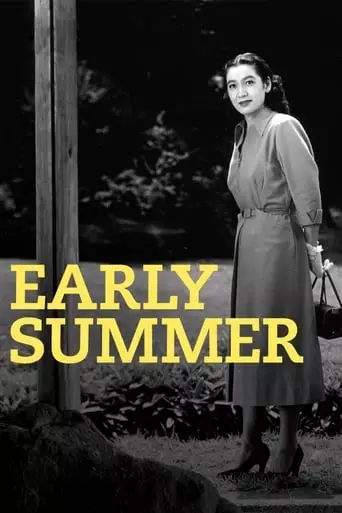
Early Summer (1951) Watch Online Free
A 28-year-old single woman is pressured to marry.
Early Summer (1951), directed by Yasujirō Ozu, is a poignant exploration of family dynamics and societal expectations in post-war Japan. The narrative centers on Noriko Mamiya (Setsuko Hara), a 28-year-old woman living with her extended family in Kamakura. Her parents, Shūkichi (Chishū Ryū) and Shige (Chieko Higashiyama), her older brother Kōichi (Shūji Sano), his wife Fumiko (Kuniko Miyake), and their two young sons, Minoru and Isamu, all reside together, reflecting the traditional family structure of the time.
The story unfolds when an elderly uncle visits the family and subtly reminds them that Noriko, at 28, should consider marriage. This remark sets off a series of events where the family, particularly her parents, begin to contemplate potential suitors for Noriko. Her boss, Satake (Shūji Sano), suggests a match with Mr. Manabe, a 40-year-old businessman and golfer. Despite the family’s gentle pressure, Noriko remains indifferent to the idea of marriage.
The plot takes a turn when Noriko’s childhood friend, Kenkichi Yabe (Hiroshi Nihon’yanagi), a widower and father to a young daughter, returns to town. He offers Noriko a sheaf of wheat, a gift from his late brother who had been killed during World War II. This gesture rekindles their connection, and Noriko impulsively agrees to marry Kenkichi and move with him to Akita, a rural area in northern Japan. This decision shocks her family, who had envisioned a different future for her.
The film delicately portrays the family’s initial resistance and eventual acceptance of Noriko’s choice. Her parents, though disappointed, come to terms with her decision, understanding her desire for personal happiness. The narrative concludes with a poignant scene of Noriko’s parents watching a bride pass down a country road, symbolizing the passage of time and the changing dynamics within the family.
Early Summer is celebrated as one of Ozu’s masterpieces, showcasing his signature style of understated storytelling and deep emotional resonance. The film’s exploration of universal themes such as family, change, and personal choice has garnered critical acclaim. It holds a 100% approval rating on Rotten Tomatoes, with critics praising its richness, humor, and emotional depth.
The film’s influence extends beyond Japanese cinema, impacting filmmakers worldwide with its subtlety and humanism. Its portrayal of family dynamics and societal change offers a timeless reflection on the human condition, making it a significant work in the history of cinema.
After watching Early Summer, you will likely feel a mix of emotional reflection and quiet contemplation. The film’s subtle yet powerful exploration of family dynamics, societal expectations, and personal choice will resonate with you on a deep level. As you witness Noriko’s journey of self-discovery and the emotional complexities of her family, you may find yourself reflecting on your own relationships and the societal pressures that shape them. The gentle pacing and understated storytelling will leave you with a sense of calm, but also a touch of melancholy, as you consider the inevitable changes that come with time.
The film’s ending, with Noriko leaving her family to start a new life, will evoke a bittersweet feeling. There’s a sense of closure, but also a realization of the passage of time and the emotional weight of familial bonds. Ozu’s delicate handling of this theme will make you appreciate the importance of human connections, but also acknowledge the inevitability of change. You may feel a sense of emotional fulfillment, as the film’s themes of love, sacrifice, and personal autonomy are explored in a way that feels both timeless and deeply human.
Ultimately, after watching Early Summer, you will likely be left with a lingering sense of appreciation for the simplicity and beauty of life’s everyday moments. The film encourages introspection and offers a gentle reminder of the importance of family, love, and the quiet decisions that shape our lives. The emotional depth of the film, combined with its understated visual style, will leave you feeling both moved and reflective, as you consider the complexities of your own personal relationships and the passage of time.
